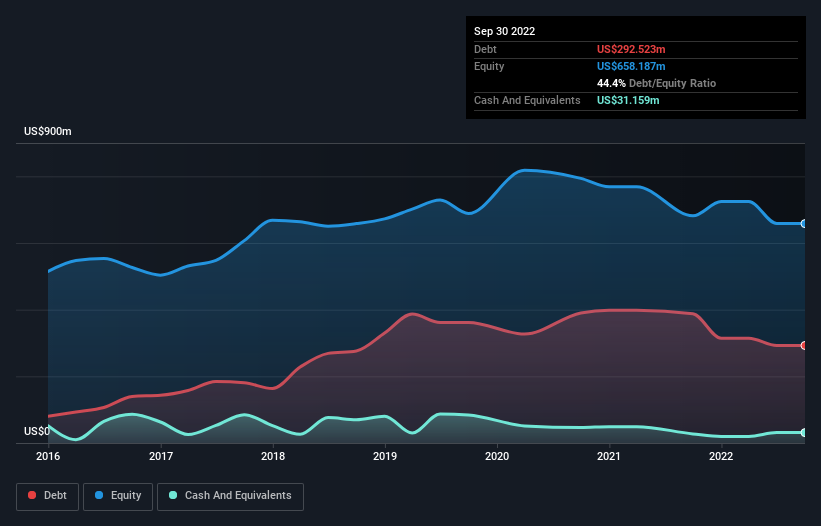
Warren Buffett famously said, 'Volatility is far from synonymous with risk.' So it seems the smart money knows that debt - which is usually involved in bankruptcies - is a very important factor, when you assess how risky a company is. Importantly, Yoma Strategic Holdings Ltd. (SGX:Z59) does carry debt. But should shareholders be worried about its use of debt?
When Is Debt A Problem?
Debt assists a business until the business has trouble paying it off, either with new capital or with free cash flow. If things get really bad, the lenders can take control of the business. However, a more common (but still painful) scenario is that it has to raise new equity capital at a low price, thus permanently diluting shareholders. Of course, plenty of companies use debt to fund growth, without any negative consequences. The first thing to do when considering how much debt a business uses is to look at its cash and debt together.
See our latest analysis for Yoma Strategic Holdings
What Is Yoma Strategic Holdings's Debt?
As you can see below, Yoma Strategic Holdings had US$292.5m of debt at September 2022, down from US$387.9m a year prior. However, because it has a cash reserve of US$31.2m, its net debt is less, at about US$261.4m.

A Look At Yoma Strategic Holdings' Liabilities
Zooming in on the latest balance sheet data, we can see that Yoma Strategic Holdings had liabilities of US$209.6m due within 12 months and liabilities of US$281.1m due beyond that. Offsetting these obligations, it had cash of US$31.2m as well as receivables valued at US$101.4m due within 12 months. So it has liabilities totalling US$358.2m more than its cash and near-term receivables, combined.
This deficit casts a shadow over the US$206.3m company, like a colossus towering over mere mortals. So we'd watch its balance sheet closely, without a doubt. At the end of the day, Yoma Strategic Holdings would probably need a major re-capitalization if its creditors were to demand repayment. The balance sheet is clearly the area to focus on when you are analysing debt. But you can't view debt in total isolation; since Yoma Strategic Holdings will need earnings to service that debt. So if you're keen to discover more about its earnings, it might be worth checking out this graph of its long term earnings trend.
Over 12 months, Yoma Strategic Holdings made a loss at the EBIT level, and saw its revenue drop to US$77m, which is a fall of 11%. We would much prefer see growth.
Caveat Emptor
While Yoma Strategic Holdings's falling revenue is about as heartwarming as a wet blanket, arguably its earnings before interest and tax (EBIT) loss is even less appealing. To be specific the EBIT loss came in at US$6.3m. When we look at that alongside the significant liabilities, we're not particularly confident about the company. It would need to improve its operations quickly for us to be interested in it. It's fair to say the loss of US$23m didn't encourage us either; we'd like to see a profit. And until that time we think this is a risky stock. There's no doubt that we learn most about debt from the balance sheet. But ultimately, every company can contain risks that exist outside of the balance sheet. Case in point: We've spotted 2 warning signs for Yoma Strategic Holdings you should be aware of, and 1 of them is a bit unpleasant.
Of course, if you're the type of investor who prefers buying stocks without the burden of debt, then don't hesitate to discover our exclusive list of net cash growth stocks, today.
New: Manage All Your Stock Portfolios in One Place
We've created the ultimate portfolio companion for stock investors, and it's free.
• Connect an unlimited number of Portfolios and see your total in one currency
• Be alerted to new Warning Signs or Risks via email or mobile
• Track the Fair Value of your stocks
Have feedback on this article? Concerned about the content? Get in touch with us directly. Alternatively, email editorial-team (at) simplywallst.com.
This article by Simply Wall St is general in nature. We provide commentary based on historical data and analyst forecasts only using an unbiased methodology and our articles are not intended to be financial advice. It does not constitute a recommendation to buy or sell any stock, and does not take account of your objectives, or your financial situation. We aim to bring you long-term focused analysis driven by fundamental data. Note that our analysis may not factor in the latest price-sensitive company announcements or qualitative material. Simply Wall St has no position in any stocks mentioned.
About SGX:Z59
Yoma Strategic Holdings
An investment holding company, engages in the real estate, motor, leasing, mobile financial, food and beverages, and investment businesses in Singapore, Myanmar, and the People’s Republic of China.
Adequate balance sheet very low.
Market Insights
Community Narratives



